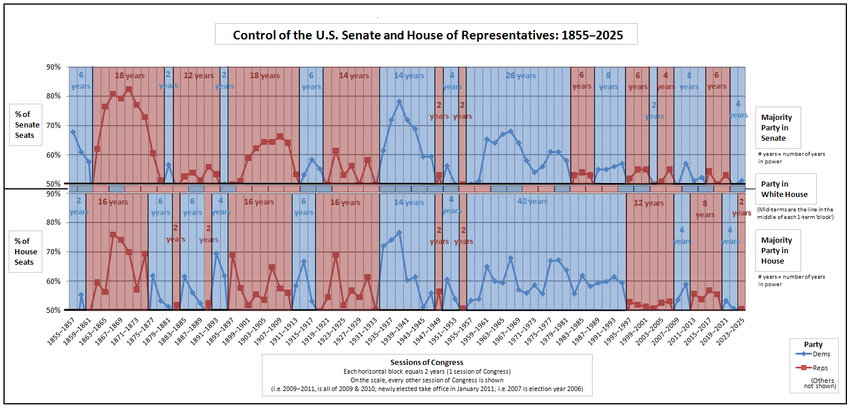Allegory: The Lion King (1994)
The lure of fascism: Gabriel Over the White House (1933):
Prophecy: Contagion (2011!)
The rule of law: A Man for All Seasons (1966)
This blog serves the our introductory course on American politics (Claremont McKenna College Government 20) for the spring of 2025. During the semester, I shall post course material and students will comment on it. Students are also free to comment on any aspect of American politics, either current or historical. There are only two major limitations: no coarse language, and no derogatory comments about people at the Claremont Colleges.
Allegory: The Lion King (1994)
The lure of fascism: Gabriel Over the White House (1933):
Prophecy: Contagion (2011!)
The rule of law: A Man for All Seasons (1966)
Will post a practice final this week.
Adjourn at noon for student experience survey
Considering the separation of church and state, how is a president justified in using the word "God" at all? The answer is that the separation of church and state has not denied the political realm a religious dimension. Although matters of personal religious belief, worship, and association are considered to be strictly private affairs, there are, at the same time, certain common elements of religious orientation that the great majority of Americans share. These have played a crucial role in the development of American institutions and still provide a religious dimension for the whole fabric of American life, including the political sphere. This public religious dimension is expressed in a set of beliefs, symbols, and rituals that I am calling American civil religion. The inauguration of a president is an important ceremonial event in this religion. It reaffirms, among other things, the religious legitimation of the highest political authority.
JFK:
Solemn oath
JFK quoted the Protestant King James Bible, not the Catholic Confraternity Douay Bible. Protestant Ted Sorensen actually wrote the speech.
See his 1960 speech to the Houston Ministerial Association (start about one minute in):
Immigration and Nationality Act of 1965 (JFK supported, LBJ saw it become law)
Immigration trends (Mo is a CMC alum)
War
Disability:
For next Monday: http://www.robertbellah.com/articles_5.htm
Also on Monday, bring your devices to complete the Student Experience Survey
Review: Ballot measures: Dialysis example and SEIU
Tocqueville (Lawrence/Mayer ed., pp. 513, 518):
Americans of all ages, all stations in life, and all types of disposition are forever forming associations. There are not only commercial and industrial associations in which all take part, but others of a thousand different types- religious, moral, serious, futile, very general and very limited, immensely large and very minute. Americans combine to give fêtes, found seminaries, build churches, distribute books, and send missionaries to the antipodes. Hospitals, prisons, and schools take shape in that way. Finally, if they want to proclaim a truth of propagate some feeling by the encouragement of a great example, they form an association. In every case, at the head of any new undertaking, where in France you would find the government or in England some territorial magnate, in the United States you are sure to find an association.
...
It often happens in democratic countries that many men who have the desire or directed toward that light, and those wandering spirits who had long sought each other the need to associate cannot do it, because all being very small and lost in the crowd, they do not see each other and do not know where to find each other. Up comes a newspaper that exposes to their view the sentiment or the idea that had been presented to each of them simultaneously but separately. All are immediately in the shadows finally meet each other and unite.
For Wednesday:
In Federalist 10, Madison described the sources of faction
A zeal for different opinions concerning religion, concerning government, and many other points, as well of speculation as of practice; an attachment to different leaders ambitiously contending for pre-eminence and power; or to persons of other descriptions whose fortunes have been interesting to the human passions... But the most common and durable source of factions has been the various and unequal distribution of property. Those who hold and those who are without property have ever formed distinct interests in society. Those who are creditors, and those who are debtors, fall under a like discrimination. A landed interest, a manufacturing interest, a mercantile interest, a moneyed interest, with many lesser interests, grow up of necessity in civilized nations, and divide them into different classes, actuated by different sentiments and views.
Just about every group has an organization -- even this one.
DO NOT REDUCE INFLUENCE TO CAMPAIGN MONEY
For next time, Lowi, ch. 12

Plunkitt, Tweed, and Machines
Transparency v. Compromise
Super PACs as "Shadow Machines"
Machines and Community Organizing (a week from today)
For Wednesday:
PIE/PO/PIG/POG
"Great Parties"
Tocqueville (175): “What I call great political parties are those more attached to principles than to consequences, to generalities rather than to particular cases, to ideas rather than to personalities... America has had great parties; now they no longer exist”
The line is now drawing so clearly as to shew, on one side, 1. the fashionable circles of Phila., N. York, Boston and Charleston (natural aristocrats), 2. merchants trading on British capitals. 3. paper men, (all the old tories are found in some one of these three descriptions).
On the other side are 1. merchants trading on their own capitals. 2. Irish merchants, 3. tradesmen, mechanics, farmers and every other possible description of our citizens.
Party in the Electorate (PIE)
History
